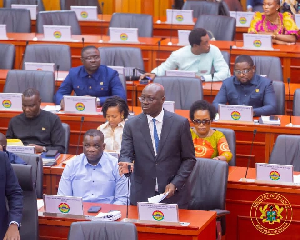Bolgatanga — There is imminent danger in the Upper East Region where the health care delivery system faces a collapse as a result of depleting stocks of medical supplies at the Bolgatanga Region Medical Stores.
Stocks of essential drugs, including anti-malaria medicines, are said to be running lower by the day with hapless regional health authorities saddled with over GHC2 million debts owed to suppliers.
Our checks have revealed that public health facilities in the eight districts and two municipalities in the region, including Bunkprungu Yuuyoo District, are indebted to the Bolgatanga Regional Medical Stores to the tune of GH?2, 149,187.92.
The debt has been attributed to delays by the National Health Insurance Authority to pay claims made by the facilities some of which submitted the claims as far back as June.
The debts have also affected stocks of non-drug consumables which are fast depleting.
It is already feared that the debts, if not addressed properly and timely, could affect healthcare delivery in the region, which is one of the country's poorest regions.
At a recent Regional Emergency Health Planning Meeting in Bolgatanga which was attended by District Health Directors, Heads of Facilities and other top health management officials, the Regional Director of Health Services, Dr. John Koku Awonoor Williams, said the unfortunate situation has already led to a depletion of stocks at the Regional Medical Stores by 50%.
According to him, the total debt owed the medical stores from medicine supplied stands at GH 1,310,728.08 whiles that of non-medicine makes up GH838,459.08.
Although he was unhappy that suppliers of the Regional Medical Stores have actually rejected all appeals to replenish depleting stocks, Dr. Awonoor said it is not entirely the fault of the suppliers as they are faced with economic realities and practical business conditions.
If we cannot pay what we have been supplied what justification do we have to ask for more he queried.
Don't forget we have an obligation, he observed, explaining, We have an obligation to meet the health needs of the population and we cannot afford to disappoint them when they call in. We need to pay what we own to the medical stores to keep it running so that we can continue to get medical supplies at our facilities to save lives.
Turning attention to health service providers, Dr. Awonoor cautioned them to endeavor to use prudent management skills and desist from flouting standard financial standing orders such as declaring drug accounts as non-drug accounts and vice versa.
Meanwhile, some health providers have accused the NHIA of arbitrary rejection of some prescription bills and a further refusal to return the rejected bills to the providers, a situation they say is costly to them.
Responding, the Regional Coordinator of the National Health Insurance Scheme, Mr. Roger Apusiwine, pleaded with the providers to bear with the Scheme Managers, saying the failure of the scheme to make prompt payment of claims is largely due to the fact that funds take time to accumulate from the various sources before payments can be made.
He rebutted claims that there are usually deliberate delays in the process.
Nonetheless, Mr. Apusiwine admitted that the Upper East Region is among the group of regions that have made payments only up to June.
He however announced that his office is in receipt of the checks for July which he indicated might help to reduce the burden of debt on the regional medical stores.
The Upper East Region revamped its Regional Medical Stores in 2009, instituting the door-to-door medical supply system. This is the practice where all public health facilities in the region make their request to the Regional Medical Stores and have them delivered at their facility at no cost.
According to the Deputy Director in charge of Administration at the Regional Health Directorate, Mr. Lucio Dery, since 2009 the door-to-door medical supply system in the Upper East Region has worked like magic. With a strategic delivery system plan called the Requisition Report Issue Received Voucher (RRIRV) adequate timely supplies are delivered at the points of need.
Mr. Dery adds: Before the coming into being of the new system the delivery of medical supplies by individual facilities used to come with a lot of cost. You can imagine there were times some facilities in the remotest communities could dispatch the only vehicle at the facility to medical stores to fetch supplies irrespective of what else it's needed for. Today, such and other costly experiences are now things of the past.
The indebtedness of various districts to the Regional Medical Stores is as follows:
District Medicine Non Medicine Total
Bawku East 130,100.93 56,883.63 186,984.56
Bawku West 103,362.62 65,505.58 168,868.20
Bolga Municipal 343,922.12 312,153.24 656,075.36
Bongo 212,052.78 144,314.41 536,367.19
Bulsa 82,659.93 37,436.95 120,096.88
Bunkrugu Yuuyoo 1,548.40 245.20 1,793.60
Garu Tempane 106,047.96 38,376.87 144,424.83
Ksena Nakana East 139,448.73 116,312.33 255,761.06
Kasena Nakana West 111,895.79 33,223.11 145,118.90
Talensi Nabdam 85,105.54 33,334.92 118,440.46
1,310,728.08 838,459.08. 2,149187.92.
General News of Monday, 28 November 2011
Source: Public Agenda












